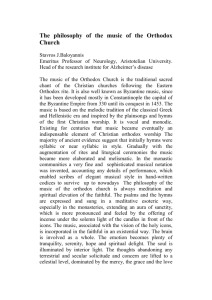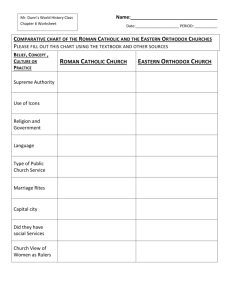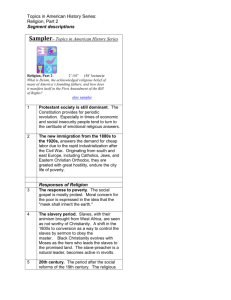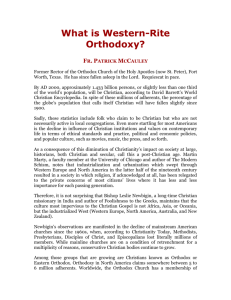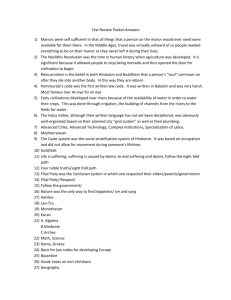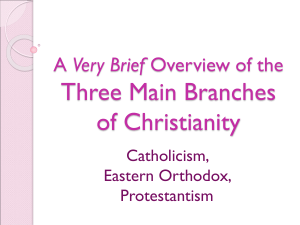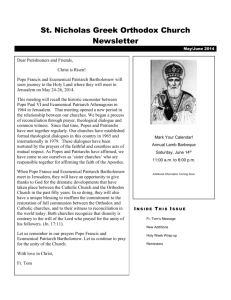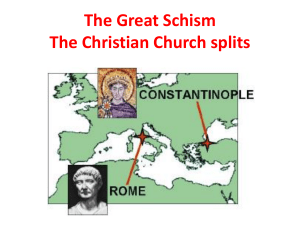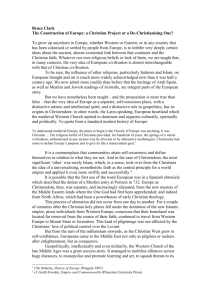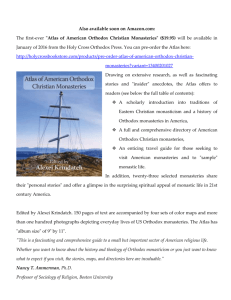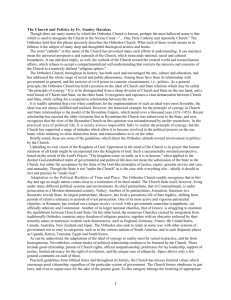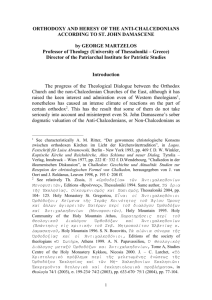Fr. Olof Scott`s Greetings to NALC 2011 (Word)
advertisement
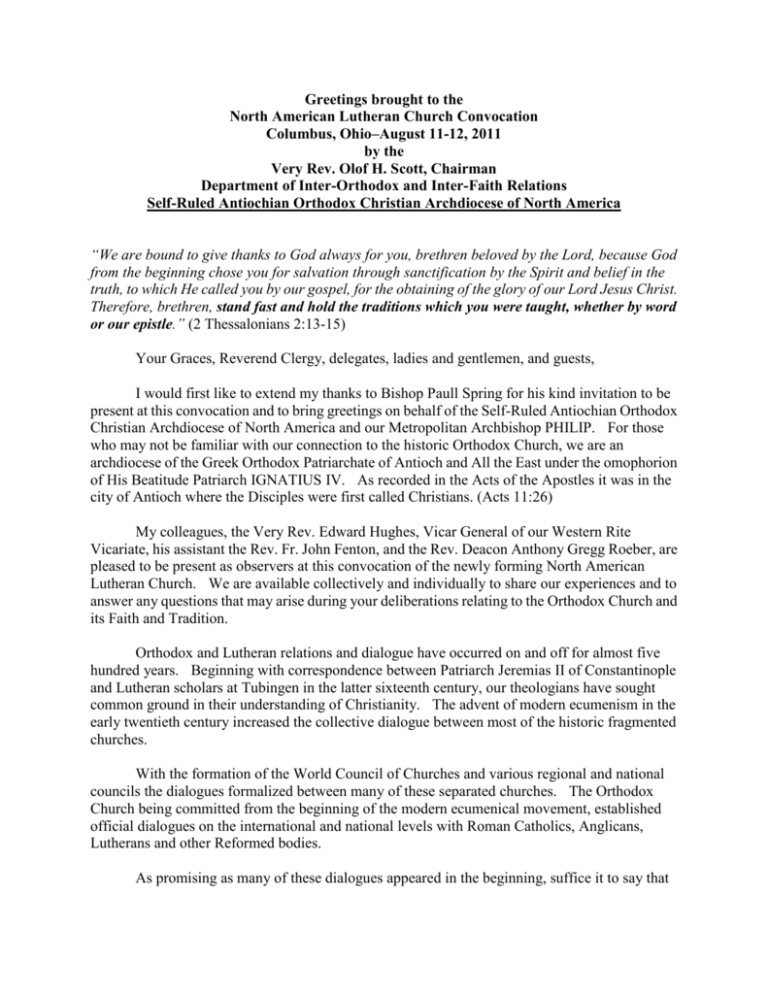
Greetings brought to the North American Lutheran Church Convocation Columbus, Ohio–August 11-12, 2011 by the Very Rev. Olof H. Scott, Chairman Department of Inter-Orthodox and Inter-Faith Relations Self-Ruled Antiochian Orthodox Christian Archdiocese of North America “We are bound to give thanks to God always for you, brethren beloved by the Lord, because God from the beginning chose you for salvation through sanctification by the Spirit and belief in the truth, to which He called you by our gospel, for the obtaining of the glory of our Lord Jesus Christ. Therefore, brethren, stand fast and hold the traditions which you were taught, whether by word or our epistle.” (2 Thessalonians 2:13-15) Your Graces, Reverend Clergy, delegates, ladies and gentlemen, and guests, I would first like to extend my thanks to Bishop Paull Spring for his kind invitation to be present at this convocation and to bring greetings on behalf of the Self-Ruled Antiochian Orthodox Christian Archdiocese of North America and our Metropolitan Archbishop PHILIP. For those who may not be familiar with our connection to the historic Orthodox Church, we are an archdiocese of the Greek Orthodox Patriarchate of Antioch and All the East under the omophorion of His Beatitude Patriarch IGNATIUS IV. As recorded in the Acts of the Apostles it was in the city of Antioch where the Disciples were first called Christians. (Acts 11:26) My colleagues, the Very Rev. Edward Hughes, Vicar General of our Western Rite Vicariate, his assistant the Rev. Fr. John Fenton, and the Rev. Deacon Anthony Gregg Roeber, are pleased to be present as observers at this convocation of the newly forming North American Lutheran Church. We are available collectively and individually to share our experiences and to answer any questions that may arise during your deliberations relating to the Orthodox Church and its Faith and Tradition. Orthodox and Lutheran relations and dialogue have occurred on and off for almost five hundred years. Beginning with correspondence between Patriarch Jeremias II of Constantinople and Lutheran scholars at Tubingen in the latter sixteenth century, our theologians have sought common ground in their understanding of Christianity. The advent of modern ecumenism in the early twentieth century increased the collective dialogue between most of the historic fragmented churches. With the formation of the World Council of Churches and various regional and national councils the dialogues formalized between many of these separated churches. The Orthodox Church being committed from the beginning of the modern ecumenical movement, established official dialogues on the international and national levels with Roman Catholics, Anglicans, Lutherans and other Reformed bodies. As promising as many of these dialogues appeared in the beginning, suffice it to say that this is hardly the situation today. On our national level only the Orthodox–Roman Catholic dialogue remains active. What has happened? Over fifty years ago our interaction with each other centered on Faith and Order with a common vocabulary regarding the Trinity, Christology and Ecclessiology. Cooperation between us on issues regarding Life and Work were predicated on a common understanding of “traditional” Christian ethics and morality. Since that time ecumenical dialogue has become increasingly stressful. Any attempt at serious discussion of Faith and Order issues has slowly been choked by an evolving reinterpretation of the understanding of those classical Christian ethics and morality that we once held in common. During these ensuing years it appears that historic Protestantism has embraced the principle of “Chronological Snobbery” a term coined by C. S. Lewis and Owen Barfield which implies that the thinking, art or science of an earlier time is inherently inferior when compared to that of the present. When applied to Christian ethics and morality this principle serves to bring to question all of what we have inherited from Christian tradition in light of our changing modern culture and society and, therefore, the attempt to bring them in line with this more modern thinking. Metropolitan Hilarion Alfeyev, chairman of the Moscow Patriarchate’s Department for External Church Relations, describes our current condition as follows: “Nowadays it is increasingly difficult to speak of ‘Christianity’ as a unified scale of spiritual and moral values, universally adopted by all Christians. It is more appropriate, rather, to speak of ‘Christianities,’ that is, different versions of Christianity espoused by diverse communities. “All current versions of Christianity can be very conditionally divided into two major groups–traditional and liberal. The abyss that exists today divides not so much the Orthodox from the Catholics or the Catholics from the Protestants as it does the ‘traditionalists’ from the ‘liberals.’ Some Christian leaders, for example, tell us that marriage between a man and a woman is no longer the only way of building a Christian family: there are other models and the Church should be appropriately ‘inclusive’ to recognize alternative behavioral standards and give them official blessing. Some try to persuade us that human life is no longer an absolute value; that it can be terminated in a mother’s womb or that one can terminate one’s life at will. Christian ‘traditionalists’ are being asked to reconsider their views under the slogan of keeping abreast with modernity.” Orthodox Christianity will testify that the Holy Spirit is alive and well and can lead us to new revelations of God. In effect this is our understanding of Tradition, which was aptly expressed by Vladimir Lossky as the “life of the Holy Spirit in the Church–the life giving to every member of the Body of Christ the ability to hear, accept and know the Truth in its inherent shining, not in the natural light of human reason.” We would add that it is imperative that any new revelation regarding God, Jesus Christ and His Holy Church must be compatible with, and in continuity with, divine revelation of the past. Any perceived new revelation that is discontinuous or totally out of line with historic divine revelation must be questioned as being inspired by spirits other than the Holy Spirit. As Orthodox Christians we are committed to ecumenical and bi-lateral dialogue, and where it has ceased we are always open to reestablish it. However, any serious dialogue for us must be grounded in two principles which are crucial to our involvement and collaboration with the ecumenical movement: “The first is the Confessional principle which stresses that Christian unity is grounded and expressed in the unity of the Apostolic Tradition, and that the divisions among Christians, complicated as they may be by “non-theological” (cultural, historical, socio-psychological, etc.) factors, are ultimately rooted in deviations from the one faith. These divisions cannot be healed by compromise or doctrinal minimalism. Differences should be overcome through reference to the very sources of Revelation in patient and honest study of each particular controversial issue. “The second is the Ecclesiological principle which affirms that the ultimate goal of the ecumenical movement is the unity of mankind in the one Church which is the manifestation in this world of the Kingdom of God. The Orthodox Church considers herself as the visible, historical realization of the one Church. Accordingly, any attempt to substitute this goal of reconciliation in the one Church with other concerns is to destroy the basis for cooperation in the ecumenical movement. There can be no confusion between the earthly city with the heavenly city or a radical departure from the ecclesial for purely social, political or secular concerns. True humanity and true community are rooted in the Church and must be seen from this theocentric perspective rather than that of other ideologies.” (General Ecumenical Principles, Clergy Guide of the Self-Ruled Antiochian Orthodox Christian Archdiocese of North America, Third Edition, 2011) Finally we are pleased to be with you at this historic occasion. We recognize the underlying issues that led you and your congregations to forego continued participation in your former denomination and which have brought you to seek to covenant with each other in a new church which can render glory to Jesus Christ. Our prayers resonate with yours that this would be accomplished. But we must confess that we do so with a proviso, and if we can be so bold, with a cautionary pastoral word of advice. Not wishing to appear negative, we must boldly and truthfully point out that the history of the Christian Protestant world, especially in the United States, has been one of continued fracturing, splitting and schism as mentioned previously. In light of this tendency, there is a significant probability that your efforts to establish the North American Lutheran Church and to preserve it to the best of your ability will eventually result in another division in the not-so-distant future. A great many of the current faithful of our Antiochian Archdiocese, both clergy and laity, are not cradle Orthodox Christians. They were formerly members of Catholic, Episcopalian, Lutheran, Methodist, Presbyterian, Reformed, Baptist, Pentecostal and Evangelical churches of every kind. A good many of them endured similar agonies as you experienced over and over again, as you watched your denomination make change after change, slowly taking them further and further away from traditional Christianity. I have heard more than one of them say of their experience after they came to the Holy Orthodox Church, “I didn’t leave my church. My church left me.” The Western Rite Vicariate exists within our archdiocese to provide a home in the Orthodox Church for western people of non-Byzantine cultural and religious background and to witness to the catholicity of the Holy Orthodox Church. While providing a missionary outreach to Western Christians and others throughout North America, the vicariate also preserves an important part of Orthodox Catholic Tradition as a precious treasure of the Church; not to be forgotten or overlooked because of the overwhelmingly Byzantine image that the Orthodox Church projects today. Celebrating fifty (50) years in our archdiocese the vicariate currently has 24 parishes and missions served by 31 priests and 11 deacons. And recently the growth of the Western Rite has continued with the Russian Orthodox Church Outside of Russia receiving 10 new parishes and missions within their jurisdiction adding to several which they already had. In conclusion I return again to St. Paul’s words to the faithful at Thessalonika with which I began my remarks this evening: “Therefore, brethren, stand fast and hold the traditions which you were taught whether by word or our epistle. Now may our Lord Jesus Christ Himself, and our God and Father, who has loved us and given us everlasting consolation and good hope by grace, comfort your hearts and establish you in every good word and work.” (2 Thessalonians 2:15-17) We, the Antiochian Orthodox, wish you well in your deliberations through the guidance of the Holy Spirit. It has been our privilege to be present with you this week and we pray that God’s blessings would reside with you and that He grant you many years!
